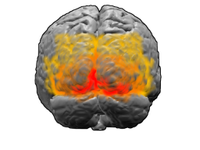
Photo from wikipedia
Adult humans make effortless use of multisensory signals and typically integrate them in an optimal fashion.1 This remarkable ability takes many years for normally sighted children to develop.2,3 Would individuals… Click to show full abstract
Adult humans make effortless use of multisensory signals and typically integrate them in an optimal fashion.1 This remarkable ability takes many years for normally sighted children to develop.2,3 Would individuals born blind or with extremely low vision still be able to develop multisensory integration later in life when surgically treated for sight restoration? Late acquisition of such capability would be a vivid example of the brain's ability to retain high levels of plasticity. We studied the development of multisensory integration in individuals suffering from congenital dense bilateral cataract, surgically treated years after birth. We assessed cataract-treated individuals' reliance on their restored visual abilities when estimating the size of an object simultaneously explored by touch. Within weeks to months after surgery, when combining information from vision and touch, they developed a multisensory weighting behavior similar to matched typically sighted controls. Next, we tested whether cataract-treated individuals benefited from integrating vision with touch by increasing the precision of size estimates, as it occurs when integrating signals in a statistically optimal fashion.1 For participants retested multiple times, such a benefit developed within months after surgery to levels of precision indistinguishable from optimal behavior. To summarize, the development of multisensory integration does not merely depend on age, but requires extensive multisensory experience with the world, rendered possible by the improved post-surgical visual acuity. We conclude that early exposure to multisensory signals is not essential for the development of multisensory integration, which can still be acquired even after many years of visual deprivation.
Journal Title: Current Biology
Year Published: 2021
Link to full text (if available)
Share on Social Media: Sign Up to like & get
recommendations!